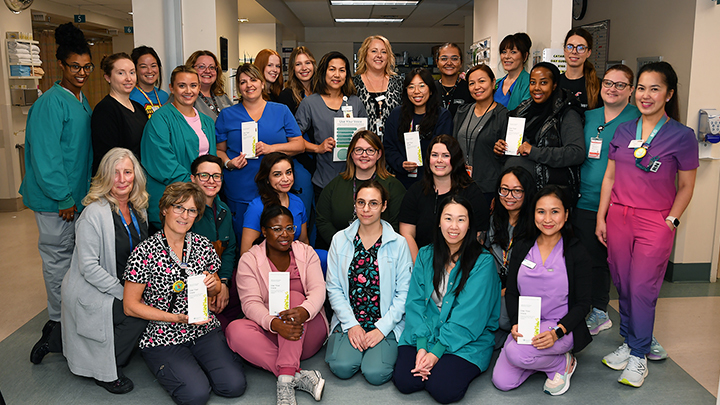
November 14, 2024

Manager Stacy Banks and staff at the Day Surgery department gather at the Royal Alexandra Hospital in Edmonton, with many holding up the new Use Your Voice patient brochure. Supplied.
Story by Katie McLaughlin
As a patient-centred healthcare organization, Alberta Health Services (AHS) is committed to continually improving the healthcare experience of all Albertans seeking care. That’s why in April 2024, we introduced Shared Commitments — a set of eight commitments between patients and healthcare providers — co-created with those who receive and provide care.
“Shared Commitments are meant to support the enhancement of patient and healthcare provider partnerships, through the creation of mutually understood expectations,” says Jennifer Symon, a senior consultant with AHS’ Engagement and Patient Experience team.
“They address areas that we know impact the healthcare experience of patients and their families most frequently. There’s a shared responsibility in moving the Shared Commitments from words into actions — patients, families, staff, healthcare providers and volunteers all have a role to play.”
One initiative that already aligns closely with Shared Commitments is Use Your Voice: Dare to Listen at Edmonton’s Royal Alexandra Hospital (RAH). The program started in 2019 in response to a family-care concern regarding a breakdown in family and care provider communication. Initially, it was adopted by a specific program, and has since become a site-wide initiative. It’s meant to enhance engagement and communication between healthcare workers, patients and families about safety or care concerns, and ensure that everyone knows their voice matters.
“Use Your Voice: Dare to Listen is a responsive escalation strategy that promotes a psychologically safe environment for everyone,” says Karina Lopuszak, senior advisor in the RAH’s Patient and Provider Experience Office.
“It’s intended to create and sustain a culture that enables any patient and their family, staff, healthcare provider or volunteer to advocate their perspective, speak up confidently and respectfully and have that communication met in a responsive and collaborative way.”
When Shared Commitments launched earlier this year, Lopuszak and team immediately saw similarities to Use Your Voice and started looking at ways to ensure they’re aligned. This, says Symon, is a perfect way to start putting Shared Commitments into practice.
“The intention behind Shared Commitments isn’t new,” adds Symon. “They build on our AHS values and on the great work already taking place across the province to support patients and families in accessing high-quality, safe care. There are many great initiatives out there that already put the Shared Commitments in action, but there’s also opportunity for continuous improvement and we encourage teams to use Shared Commitments as a guide to identify some of those opportunities.”
“From our perspective, incorporating the Shared Commitments into Use Your Voice was a fairly easy process,” adds Lopuszak. “We started by looking at what we were already doing and how it aligns with Shared Commitments. If we saw an opportunity to strengthen the connection, we considered what we’d need to do to enhance our program. It’s an ongoing process, but we’re excited to see how our program already aligns to an important organizational initiative.”
“Use your voice and Shared Commitments are keystone strategies to enhance our communication culture at the RAH,” says Dr. Colin Peterson, RAH facility medical director. “Patient safety is paramount in any healthcare facility and clear dialogue between patients and providers is essential to effectively treat people and earn their trust.”
If you’re unsure about how to start with incorporating the Shared Commitments into your practice, Lopuszak offers some advice — start with one thing, no matter how small.
“Just pick one thing that’s missing from what you’re already doing today and start there,” she says. “Once you have something to focus on, think of what you could do to fill that gap.
“It can be as simple as doing an orientation for patients or asking them earlier in their care if you’ve addressed their concerns. It doesn’t necessarily need to be complicated, just meaningful.”
Learn about Shared Commitments and how you can incorporate them into your program or clinical practice. You can also email Shared.Commitments@ahs.ca.